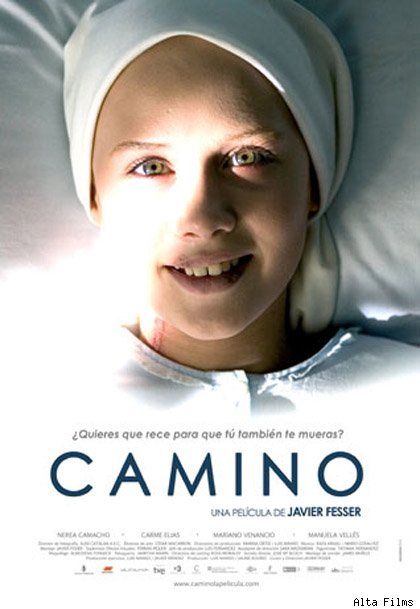
- Camino
- 138 minutes - Drama
- Original title: Camino
- Director:Javier Fesser
- Language: Spanish
- Country: Spain
A young Spanish girl discovers love and Christianity as she suffers the pangs of cancer. Inspired by a true story.

A young Spanish girl discovers love and Christianity as she suffers the pangs of cancer. Inspired by a true story.
Camino, directed by Javier Fesser, is a 2008 film about an eleven-year-old girl, named Camino (Nerea Camacho), who is very religious and whose family belongs to Opus Dei. Her life is perfectly normal (first love, friends, school), until she finds she has cancer. The movie starts with her death and tells her story retrospectively. We see her family environment, comprised of an extremely religious mother who prevents her from going to the theater because there are boys there and who even stops Camino’s sister from going to Italy with her boyfriend, hiding his letters and leading her daughter towards a life dedicated to serving Opus Dei.
Camino, which means “path,” was chosen as the name of the movie and its protagonist because of the title of the book written by Opus Dei’s founder, while the plot is inspired by the true story of Alexia González Barros, a very religious fourteen-year-old whose family is likewise linked to Opus Dei. Her story can be understood as both an actual event and as a critique of an organization. Opus Dei – “God’s work” in Latin – belongs to the Catholic Church and was founded in 1928 by Leopoldo Eijo y Garay, who was then Madrid’s bishop. Like every religious institution, it has a controversial side, especially because of its sect-like traits. Camino is full of critical jabs not only at Opus Dei but also at irrational faith. Camino’s mother is the matriarchal pillar of the family, which is made up of Camino herself, her older sister Nuria, her mother and father, and her younger brother Alejandro, who died when he was a baby.
From the beginning, the father’s figure is ignored. He has no power within the family, and everything he gives to Camino her mother hides, including a plant which she puts next to a statue of Opus Dei’s founder. When Camino hears from her mother that Jesus Christ was alone in Gethsemane, but that surely the Virgin Mary prayed for him in Nazareth, Camino asks: “And where was the father?” Just like Jesus’ father, Camino’s is called José (or Joseph). This might explain why her father is an absent figure, since Joseph did not play a big role in Jesus’ life (from a Biblical standpoint). Camino’s favorite children’s book is Mr. Meedles has a problem. In it, Mr. Meedles is described as “a good, wise man who knows everything but has a problem… he is invisible,” and when her father reads her the story, he asks her if she already knows it, to which she replies: “Yes, and you do too.” The only person who realizes the father’s absence is Camino, who also loves him the most.

Also interesting is that the boy Camino is in love with is named Jesús, and when her mother tells her she has to love Jesus, Camino replies: “That’s what I do.” It’s almost as if romantic love and religious love were arm-wrestling each other. Another metaphor revolves around a play on words. The hospital chaplain tells Camino’s mother that it would be good if Camino spontaneously accepted being part Opus Dei, because if she died she could become a saint. Camino wanted to participate in her school’s theater play, but her mother persuaded her not to and then her disease prevented her from doing so forever. Just before dying, the young girl asks her mother: “Do you think that, in this state, they would accept me in the work?” Now, in Spanish, the word for “theater play” and for “work” is the same: “obra.” The chaplain believes that the girl wants to become part of the Opus Dei’s work, so he replies: “You are already in it.” Camino dies on June 26th, when the theater play is released, but the institution believes she died on that date because it is also the anniversary of the Opus Dei’s founder. Everything in this film has a double meaning.
Language is also important as a generational marker. Characters use a neutral Castilian accent, but with many slang words typical of teenagers. In school, there is even a girl who constantly speaks in an informal way, and she is told off by her teachers. Throughout the film, we hear words like "rollo" (boring), "guay" (cool), and "tío" (guy), which are normal for teenagers of Camino’s age.
The film won six Goya Awards (the Spanish Oscars), but didn’t escape criticism, mainly on behalf of Alexia’s family. One of her brothers complained that some of the things that happen in the movie are not real, though the movie’s director, Javier Fesser, defended himself by replying that the story was not only inspired by Alexia but also by other similar cases. Before filming started, Fesser promised Alexia's family that the girl’s name would not be included, which he didn't respect during the ending credits.
